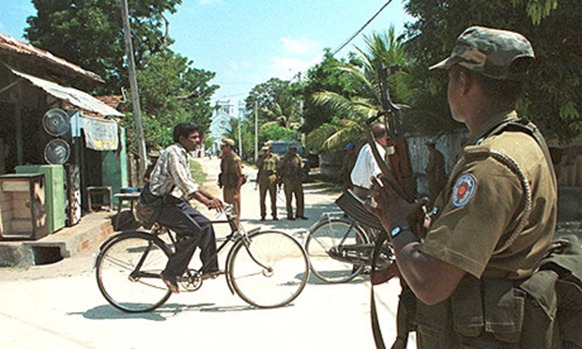Sri Lanka has been accused by Human Rights Watch of widespread abductions in its counter-insurgency operations against the Tamil Tigers. Blame is levelled against the army, navy and police, but also against the government for failing to investigate the cases properly. Jonathan Gorvett is at the Civil Monitoring Commission headquarters in Pettah, where he talks to Jasemin, a woman whose husband was abducted last year 
A Sri Lankan policeman stands guard. Photograph: Gemunu Amarasinghe/AP
Here in Pettah, the maze of roads is dense, each street lined with small shops and stalls, the pavements covered in goods for sale. I mount the metal stairs to a back office above a shop. The room is quiet and windowless, lit by a neon strip light.
Jasemin has been waiting here since 2pm with her 18-month-old boy, Shekina. There are others too; families and women with their kids mostly.
She takes her place on a chair between me and the translator. She is very young; she says she is 21. She sits like a schoolgirl, her hands folded on her skirt in front of her.
"I got married on the eighth day of the month," she begins. "Shekina was born on the eighth day of the month, and my husband was abducted on the eighth day of the month."
Her story is otherwise very similar to those of all the others patiently waiting in the airless back room. Husbands, sons, cousins, uncles – all taken, suddenly, by unknown men in unmarked white vans. Jasemin’s husband was abducted from in front of their house as he returned home one night in May 2007. On May 8. "There has to be a meaning in the number, doesn’t there?" she asks us.
"I went to the police," she continues through the interpreter. "They said that they knew nothing about any abduction; they said I should go to the other police station." But when she ran there she was told they didn’t know anything about it either, and she should go to a different police station and ask there. But when she got there she was told: "We don’t know anything either. Go back to where you started. We haven’t seen your husband."
But Jasemin had recognised the van that took him. She had seen it before, parked outside the police station, just down the street from where we are sitting. She even remembers the number. She remembers all the numbers, including the phone numbers of all the police stations she called.
"We are good Christian people," she says, her eyes beginning to water. "I met my husband in church. We never did anything wrong."
There are 210 people from Colombo on the missing list here at the Civil Monitoring Commission headquarters in Pettah. All were reportedly abducted in a similar way, by one of the notorious white vans that many Tamils say are terrorising their communities in Colombo and elsewhere.
There is a big picture of the leader of the Commission, Mano Ganesan, on the wall. "He could not be with us today", says the translator, "as he had to flee to India after he talked to the UN human rights people. He is a member of parliament, but after he talked to the UN the government withdrew all his bodyguards. He receives death threats all the time. So does his wife."
Jasemin begins to cry. After she leaves I ask the translator if anyone has ever come back after being taken away in one of the white vans. "No," he says, simply.
Most of the abducted people are Tamils, many of them born outside Colombo, often in Jaffna, a majority Tamil city in the north. It is possible that some of the disappeared were members of the Tamil Tigers, the group classified as terrorists by the UK, EU and US, which has been fighting the government since the 1980s. None of the disappeared has ever been charged or tried.
"Will writing about any of this help?" the translator asks, but he is shuffling his papers and packing to leave, already aware of the answer.
For me, out on the street and on the journey back, the roads suddenly seem to choke with white vans. I remember the words of Sunanda Deshapriya, the convenor of the Sri Lanka Free Media Movement. These days his office doubles as a dormitory for local journalists who are afraid to go home at night, after a recent spate of knife attacks on members of the media, all by unknown assailants.
"This war", he said, thinking back over more than 20 years of conflict and some 70,000 killed, "has been a silent war; unreported, unvoiced."
(For updates you can share with your friends, follow TNN on Facebook and Twitter )
